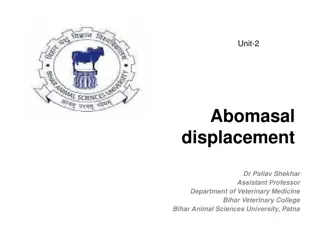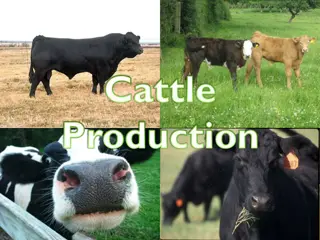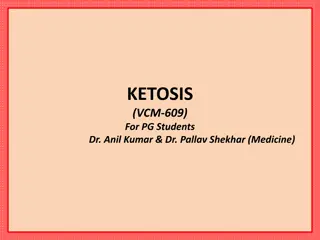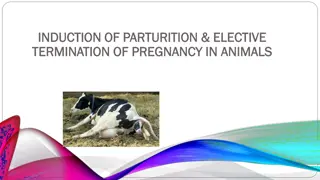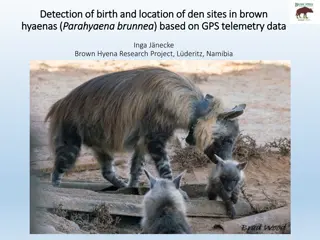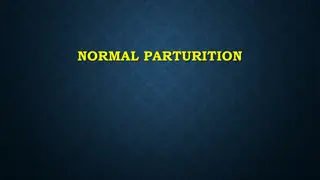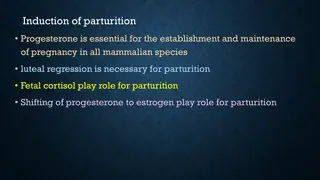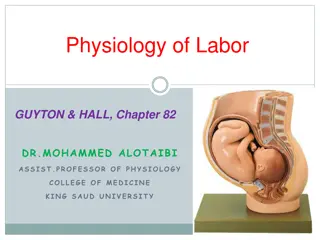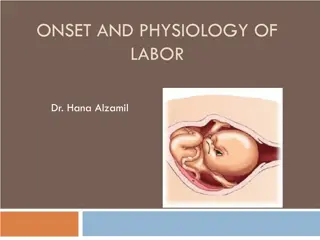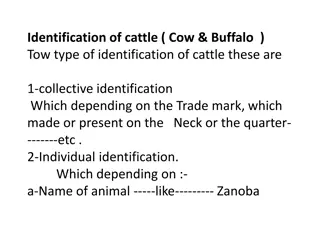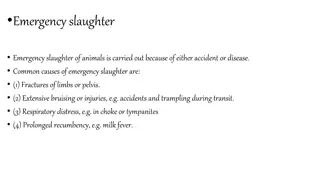Understanding Abomasal Displacement in Dairy Cattle
Abomasal displacement is a common issue in older lactating dairy cattle, often occurring within the first month post-parturition. This displacement, specifically left-sided displacement (LDA), is associated with high concentrate diets, rumen atony, and gas distension. Recognizing the signs and cause
6 views • 21 slides
Comprehensive Guide to Cattle Breeds, Management, and Terminology
Explore the world of cattle with a detailed overview of key terms, breeds like Ayrshire and Brown Swiss, management practices, and terminology such as parturition and TMR. Enhance your knowledge about heifers, steers, and animal behavior, growth, development, and health evaluation.
0 views • 85 slides
Understanding Bovine Ketosis in Dairy Cows
Bovine ketosis is a metabolic disease affecting lactating dairy cows, characterized by weight loss, reduced milk production, and neurological abnormalities. It is primarily caused by a negative energy balance post-parturition, leading to the mobilization of body fat and protein stores for energy pro
0 views • 11 slides
Understanding Induction of Parturition in Animals
Explore the process of inducing and terminating parturition in animals, including the hormonal changes associated with pregnancy, fetal nutritional demands, and indications for induction. Learn about the role of oxytocin, adrenal changes in fetuses, and various methods used for inducing parturition.
0 views • 28 slides
Study on Birth Detection and Den Site Location in Brown Hyaenas
This research project in Namibia focuses on using GPS telemetry data to detect birth, determine den site locations, and monitor population data for Brown Hyaenas. The study aims to monitor estrus, courtship/mating duration, parturition date, and den occupancy. Images depicting denning behaviors, obj
0 views • 16 slides
Understanding Normal Parturition: The Stages and Processes
Normal parturition, also known as childbirth, involves several stages including uterine contractions, cervix dilatation, fetal positioning, and the weakening of the placental connection. The process gradually prepares the birth canal for delivery, with the fetus assuming a specific position for birt
1 views • 19 slides
Understanding Induction of Parturition in Mammals
Induction of parturition in mammals involves the essential roles of progesterone, luteal regression, fetal cortisol, and the shift from progesterone to estrogen. This process is crucial for saving the lives of both the dam and fetus. Corticosteroids like dexamethasone and flumethasone are commonly u
0 views • 10 slides
Understanding the Physiology of Labor in Pregnancy
Labor, also known as parturition, is the process of uterine contractions leading to the expulsion of the fetus. Various hormonal changes, including increased estrogen levels, play a crucial role in triggering and regulating labor. The progression from a quiescent uterus to active contractions involv
0 views • 29 slides
Physiology of Labor: Onset and Key Hormonal Changes
Labor, or parturition, involves uterine contractions leading to the fetus's expulsion. Factors triggering labor include hormonal changes like increased estrogen and decreased progesterone, which stimulate uterine muscle activity. Telocytes play a role in spontaneous uterine activity, while oxytocin
0 views • 36 slides
Cattle Identification Methods and Characteristics Explained
Explore different methods of identifying cattle including collective and individual methods such as branding, tattooing, and tagging. Learn about cattle species, breeds, colors, and aging factors like dentition and parturition. Discover the main color variations in cattle such as yellow, red, black,
0 views • 36 slides
Emergency Slaughter Procedures in Livestock Management
Emergency slaughter of animals is conducted in cases of accidents or diseases, with common reasons including fractures, injuries, respiratory distress, difficult parturition, and others. Electrical stimulation of carcasses is employed for benefits like increased tenderness and flavor. Hot deboning o
0 views • 18 slides
Understanding the Three Stages of Pregnancy: Ovum, Embryo/Organogenesis, and Fetus
The journey of pregnancy involves three distinct stages, each crucial for the development of the growing embryo. The ovum stage marks the attachment of the blastocyst to the uterus, followed by the embryo/organogenesis stage where tissues and organs begin to form. Lastly, the fetus stage sees the de
0 views • 11 slides
